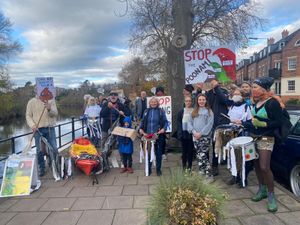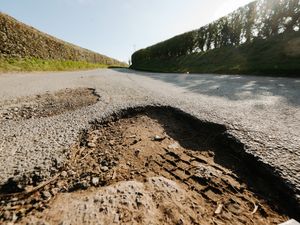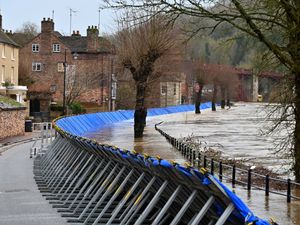Anglers 'catching more sanitary products than fish' due to raw sewage levels
Anglers are catching "more sanitary products than fish" in a river due to "embarrassing" levels of raw sewage.

Several protest marches have been held over the "unacceptable" dumping of human excrement and sanitary waste in the River Severn, in a row that has been rumbling on since the end of last year.
Now county anglers are facing a "demoralising" situation, where they say they are hooking more sewage than fish.
The situation is so bad in one area that a fishing festival has had to be cancelled.
The angling community was angered when ministers rejected a House of Lords proposal to put legal duty on water firms to reduce untreated sewage discharges in October last year.
Since then, multiple protests, including a march in Coton Hill, Shrewsbury, and a group of campaigners wearing fish heads and poo hats at Shirehall, have taken place, calling for action to be taken.
This week, a council will discuss a damning fisheries report which lays bare the problems from the anglers' perspective.
The Shrewsbury Town Council report, prepared by outdoor recreation and asset manager Mike Cox, said: "The Pengwern Boat Club area which represents the Quarry fishery area was terrible with only three fry captured of two species.
"The fisheries manager can only put this down to high levels of sewerage continuously present in this location as it comes from the Coton Hill area and affects the entire length through to the English Bridge.
"Complaints to Severn Trent are not responded to in a manner that give a sense of hope in the future. Anyone associated with Angling finds this demoralising when they cannot do anything about the impact and the damage this is doing.
"The popular three-day festival is not taking place this year due to the fishing being very poor over the past three years.
"The fisheries manager is embarrassed about our water when complaints come in that anglers are catching more sanitary products than fish. The fisheries manager will be attending a meeting in December with the Angling Trust, the Rivers Trust, Fish Legal and other organisations with respect to the Severn’s poor water quality.
"The fisheries team continue to test the water on behalf of the Angling Trust, which will continue for the foreseeable future. Water is being regularly monitored at the County Ground, Quarry, Sydney Avenue and Emstrey. Similar to the fry survey, the Quarry is showing the worst results so far although the entire length is not ideal."
Shropshire Council's Place Overview Committee recently voted unanimously in favour of setting up a "task and finish group" to lobby MPs, water companies, the Environment Agency, Defra, fisheries representatives and several others to look at ways the rivers can be cleaned up.
A Severn Trent spokesperson said: “Based on latest Environment Agency (EA) water quality measures, 78% of reasons for the Quarry fishery area in Shrewsbury not achieving good ecological status are due to other sectors and categories, with 22% within the control of Severn Trent. The EA measures show that the reasons for failure on the stretch of river are related to persistent toxic chemicals, which are not as a result of Severn Trent’s activities. The EA data also shows that two key parameters linked to thriving fisheries, dissolved oxygen and ammonia, are at better levels than those required to achieve the EA’s good river status.
“Severn Trent teams continue to actively engage with key people within the community, including relevant groups. A Severn Trent River Ranger is based in the town who, along with our operational teams, proactively monitor the network in the area and river health.
“Severn Trent is moving faster, in some cases 20 years ahead of sector targets, to improve the quality of the region’s rivers, including those in Shrewsbury. We’ve committed that our operations will not be the reason for any stretch of river in the whole Severn Trent region to be classified as unhealthy by 2030. Severn Trent is consistently recognised for its industry leading performance and this year committed to reducing the use of storm overflows to an average of 20 per year by 2025 – it’s also continuing to invest £100m a year to go even further in improving our region’s rivers.”




